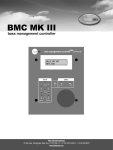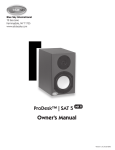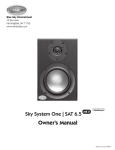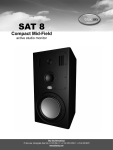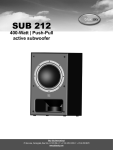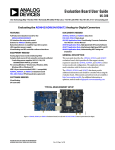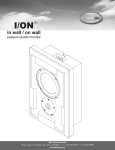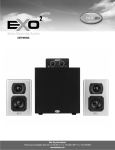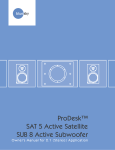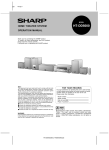Download Blue Sky International ProDesk Sat 5 Technical information
Transcript
D IO RE N TS ,I N C. B�ue Sky Internationa� 70SeaLane Farmingdale,NY11735 www.abluesky.com MK II A U Bass-Management Controller Owner’s Manua� Version1b|August5,2005 A U Contents RE N TS Safety Instructions_ _ _ _ _ _ _ _ _ _ _ _ _ _ _ _ _ _ _ _ _ Page 3 Philosophy and Introduction _ __ __ __ __ __ __ _ Page 4 Important Notes About This Owner’s Manual_ _ _ Page 4 The Blue Sky | BMC MK II - What is included?_ _ _ Page 4 A Tour of the BMC MK II I/O Unit _ _ _ _ _ _ _ _ _ _ _ Page 5 A Tour of the BMC MK II Remote _ _ _ _ _ _ _ _ _ _ _ Page 5 System Gain, Sub Offset and Level Overview_ _ _ Page 7 BMC MK II Power Up Sequence_ _ _ _ _ _ _ _ _ _ _ _ _ Page 7 Software Features_ _ _ _ _ _ _ _ _ _ _ _ _ _ _ _ _ _ _ _ _ Page 8 5.1 Speaker Placement _ _ _ _ _ _ _ _ _ _ _ _ _ _ _ _ _ Page 10 5.1 System Wiring Information & Diagram_ _ _ _ _ Page 11 5.1 System Calibration _ __ __ __ __ __ __ __ __ Page 12 Additional Surround & Setup Information_ _ _ _ _ Page 15 Dual BMC MK II I/O Unit Setup _ _ _ _ _ _ _ _ _ _ _ _ _ Page 16 Technical Information & Specifications_ _ _ _ _ _ _ Page 18 Product Dimensions _ __ __ __ __ __ __ __ __ __ Page 18 Factory Service Instructions_ _ _ _ _ _ _ _ _ _ _ _ _ _ _ Page 19 General Contact Details _ _ _ _ _ _ _ _ _ _ _ _ _ _ _ _ _ Page 19 IO D Important 1 2 3 4 5 6 7 8 9 10 11 12 13 14 15 16 17 ,I N C. Contents Safety Instructions RETAIN INSTRUCTIONS - Retain these safety and operating instructions for future reference. 3. HEED WARNINGS - Follow all warnings on this product and in the operating instructions. 4. FOLLOW INSTRUCTIONS - Follow all operating and use instructions. 5. ATTACHMENTS - Do not use attachments not recommended by the product manufacturer as they may cause hazards. 6. WATER AND MOISTURE - Do not use this product near water - for example, near a bathtub, washbowl, kitchen sink, or laundry tub; in a wet basement; or near a swimming pool; and the like. 7. ACCESSORIES - Do not place this product on an unstable cart, stand, tripod, bracket, or table. The product may fall, causing serious injury to a child or adult, and serious damage to the product. Use only with accessories recommended by the manufacturer, or sold with the product. Any mounting of the product should follow the manufacturer’s instructions and should use a mounting accessory recommended by the manufacturer. LIQUID ENTRY - Never spill any liquid of any kind on the product. 11. SERVICING - Do not attempt to service this product yourself. Opening or removing covers, including any over bottom or side speaker drivers, may expose you to dangerous voltage or other hazards. Refer all service to qualified service personnel. 12. DAMAGE REQUIRING SERVICE - Unplug this product from the wall outlet and refer servicing to qualified personnel under the following conditions: C. 2. 10. ,I N READ INSTRUCTIONS - Read all safety and operating instructions before operating this product. TS 1 a. b. POWER SOURCE - This product should be operated only from the type of power source indicated on the marking label on the back of the product. If you are unsure of the type of power that is supplied to your home, consult your product dealer or local power company. 9. A U 8. OVERLOADING - Do not overload wall outlets or extension cords as this can result in a risk of fire or electric shock. d. e. 13. REPLACEMENT PARTS - When replacement parts are required be sure the service technician has used replacement parts specified by the manufacturer or have the same characteristics as the original part. Unauthorized substitutions may result in risk of fire, electric shock, or other hazard. 14. SAFETY CHECK - Upon completion of any service or repairs to this product, ask the service technician to perform safety checks to determine that the product is in proper operating condition. 15. HEAT - This product should be situated away from heat sources such as radiators, heat registers, stoves, or other products that produce heat. D IO RE N c. When the power-supply cord or plug is damaged. If liquid has been spilled, or objects have fallen into this product. If the product does not operate normally by following the operating instructions. Adjust only controls that are covered by the operating instructions as an improper adjustment of other controls may result in damage and will often require extensive work by a qualified technician to restore the product to its normal operation. If the product has been dropped or damaged in any way. When the product exhibits a distinct change in performance - this indicates a need for service. Page 3 2. We will continually seek out opportunities to utilize the talent of the Blue Sky team to realize this philosophy. Our customer’s value requirements will always be our prime focus, and only those products that achieve our performance value ratio will earn the right to carry the Blue Sky logo. The Blue Sky BMC MK II continues this lineage and philosophy of high value and superior performance products. Designed for use with 5.1 channel monitoring systems (and beyond!), the Blue Sky BMC MK II allows for complete control of all monitoring system parameters from a single, easy-to-use, remote control. The Blue Sky BMC MK II eliminates the many variables of putting together a reliable, easy to calibrate 5.1 monitoring system, allowing the user to monitor with confidence! The Owner’s Manual: This manual addresses setup and operation of the Blue Sky BMC MK II. This product includes several performance and operational changes, when compared to the original Blue Sky BMC. We ask that you read this owner’s manual carefully, heed all warnings and contact Blue Sky International if you have any comments or questions. Contact information can be found on page 19 or you can visit www.abluesky.com. Using the Blue Sky BMC MK II with the SAT 5 or SAT 5 MK II In order to get the proper summation between SAT 5 and a Blue Sky subwoofer, when using the Blue Sky BMC MK II, it is important that you switch the internal High Pass (HP) Filter on the back of the SAT 5 to the “OUT” of circuit position. Because the BMC MK II already includes an internal High Pass Filter, leaving the internal HP filter on the SAT 5 “IN” circuit, will create a hole at the crossover point between the SAT and SUB, C. Blue Sky is a philosophy. We design each product to represent the highest ratio possible of performance to cost, providing the highest value added to our customers. We thank you for your investment in this Blue Sky product. www.abluesky.com Important notes about this Owner’s Manual Blue Sky BMC MK II what is included? TS 3. ,I N 1. ����������� Philosophy & �� Introduction A U D IO RE N The Blue Sky BMC MK II includes the items listed below. Please carefully unpack each item and inspect the components for damage. If any item has been damaged, please contact the dealer that supplied the product or Blue Sky directly. Page 4 BMC MK II Inventory: 1 BMC MK II I/O Unit 1 BMC MK II Remote 1 25 Foot, 6 conductor, RJ-11 Cable 1 Owner’s Manual 1 Warranty Card 4. A Tour of the BMC MK II - Main I/O 1. Power Switch - This switch controls the power to the BMC remote and all internal electronics. 2. 5.1 Channel Inputs - These XLR inputs should be connected to the 5.1 channel outputs of your console or digital workstation. The inputs are electronically balanced (Max input +24dBu). Do not connect more than one source to these inputs. Refer to the wiring table on page 11 for wiring custom cables and connectors. 5. Remote Control RJ-11 Connector - This standard six conductor RJ-11 jack is used to connect the main I/O unit to the BMC remote. The remote control cable length should not exceed 100 Feet. 6. IEC Power Terminal - Input Power Voltage 120 VAC / 60Hz or 240 VAC 50 / 60Hz (set at the factory), rated for 15- Watts. Use the included IEC Power Cable. C. 3. L, C, R, LS & RS Outputs - These XLR outputs should be connected to the inputs of the active monitors. These outputs are electronically balanced. These outputs can be full range or bass-managed with a bandwidth limited to spectral content above 80Hz. Refer to the wiring table on page 11 for wiring custom cables and connectors. 4. Parallel Subwoofer Outputs - These outputs can be used to drive one or more active subwoofers. The output signal is the sum total of both the LFE and the bass-managed subwoofer signal (when the bass-management feature is being used). Refer to the wiring table on page 11 for wiring custom cables and connectors. bass management controller MK II 1 TS ,I N 2 3 4 5 6 N 5. A Tour of the BMC MK II | Remote RE The Blue Sky BMC MK II has two operating modes. These two modes are referred to as “USER” and “SETUP”. Some of the buttons on the remote have two distinct functions depending on what mode the BMC MK II is operating in. The “Software Features” on page 8 and 9 explains these functions in greater detail. Main Aux 1 2 IO 1. RJ-11 Main BMC Control Output - Connect this plug to the Main BMC I/O unit with the supplied 25 ft. 6 conductor phone cable. This cable can be extended to a maximum of 100 ft. using standard 6 conductor phone (not data) cable. D 2. RJ-11 Aux BMC I/O Control Output - This output allows for the control of a second BMC I/O unit, for a total of 10.2 channels of audio. A U 3. R(ight) / + / YES Button USER MODE: The “R” button activates the solo function for the “right output”. When a second I/O unit is connected, the solo function for the “right output #2” can be activated by holding this button down for 2 seconds. Solo can be cancelled by doing any of the following; activating the solo function on another channel, muting the system, or by pressing the “REF” / reference button. SETUP MODE: The + / YES button is used to adjust parameters within the submenus. Press to increase individual channel levels, mute channels and set the reference gain setting. See the “Software Features” section on page 8 and 9 for more information. 4. C(enter) / Arrow Up Navigation Button USER MODE: The “C” button activates the solo function for the “center output”. When a second I/O unit is connected, the solo function for the “center output #2” can be activated by holding this button down for 2 seconds. Solo can be cancelled by doing any of the following; activating the solo function on another channel, muting the system, or by pressing the “REF” / reference button. SETUP MODE: Used to scroll up through the software submenus. See the “Software Features” section on page 7 and 8 for more information. MK II bass management controller 3 BLUE SKY INT REV 2.00 7 4 8 GAIN MENU 5 6 Remote c REF + NO YES LS SELECT 11 MUTE 9 R L SUB 10 RS CANCEL 12 13 Page 5 2 1 5. L(eft) / - / NO Button USER MODE: The “L” button activates the solo function for the “left output”. When a second I/O unit is connected, the solo function for the “left output #2” can be activated by holding this button down for 2 seconds. Solo can be cancelled by doing any of the following; activating the solo function on another channel, muting the system, or by pressing the “REF” / reference button. MK II bass management controller 3 BLUE SKY INT REV 2.00 8 GAIN MENU 6 c REF + NO YES LS SELECT SUB 9 10 RS CANCEL SETUP MODE: Used to scroll down through the software submenus. See the “Software Features” section on page 8 and 9 for more information. 12 13 ,I N 11 TS SETUP MODE: Hold down for 5 seconds to activate “SETUP MODE” and then press again to scroll through the main software menus, “PRESET MENU”, “MUTE CHANNELS”, “CAL(ibrate) CHANNELS” and “SETUP MENU”. See the “Software Features” section on page 8 and the 5.1 System Calibration Section on page 12 for more information. 12. RS (right surround) / CANCEL Button USER MODE: The “RS” button activates the solo function for the “right surround output”. When a second I/O unit is connected, the solo function for the “right surround output #2” can be activated by holding this button down for 2 seconds. Solo can be cancelled by doing any of the following; repeating the same action, activating the solo function on another channel, muting the system, or by pressing the “REF” / reference button. N 9. MUTE Control Button Toggles the system in and out of mute. Press this button to mute all outputs. Press again to cancel Mute. Moving the Volume Control Knob will also cancel mute . MUTE R L C. 5 6. SUB(woofer) / Arrow Down - Navigation Button USER MODE: The “SUB” button activates the solo function for the “subwoofer output”. When a second I/O unit is connected, the solo function for the “subwoofer output #2” can be activated by holding this button down for 2 seconds. Solo can be cancelled by doing any of the following; activating the solo function on another channel, muting the system, or by pressing the “REF” / reference button. 8. MUTE LED - “On” when all outputs have been muted. “Flashing” when one or more channels have been muted within the “Mute Channels” submenu of the software or if the solo function has been activated. See item 9 below. 7 4 SETUP MODE: Used to adjust parameters within the software. Press to decrease individual channel levels and un-mute channels. See the “Software Features” section on page 8 and 9 for more information. 7. REF(erence) LED - This LED is “ON” when the REF (reference) control button / setting has been activated. It indicates that the gain is set to the user predefined reference level setting. See item 10 below. Remote RE SETUP MODE: In the “PRESET MENU”, this key is used to change the letters, in the “CHANGE NAME” preset sub menu. See the “Software Features” section on page 8 and 9 for more information. IO 10. REF (reference) Control Button USER MODE: Toggles the system in and out of reference gain. Press this button to set the gain to the user defined reference gain. Press again to cancel. Moving the Volume Control Knob will bring the system out of the reference setting. D SETUP MODE: In the “PRESET MENU”, this key is used to change the letters, in the “CHANGE NAME” preset sub menu. See the “Software Features” section on page 8 and the 5.1 System “Calibration Section” on page 12 for more information. A U 11. LS (left surround) / SELECT Button USER MODE: The “LS” button activates the solo function for the “left surround output”. When a second I/O unit is connected, the solo function for the “left surround output #2” can be activated by holding this button down for 2 seconds. Solo can be cancelled by doing any of the following; repeating the same action, activating the solo function on another channel, muting the system, or by pressing the “REF” / reference button. Page 6 SETUP MODE: Press to cycle backwards through the menu and to get out of any sub menu operations. IMPORTANT: The BMC saves all changes upon exit of a menu, so any changes made will be saved, even when the “CANCEL” button is used to back out of a menu or sub menu. See the Software See the “Software Features” section on page 8 and 9 for more information. 13. Volume Control Knob - Turn to control overall nominal system gain from -50 dB to 0 dB, in .5dB increments. Turning this knob will cancel the system MUTE and REF gain operations. Turning this knob while in the menus will temporarily override the menu operation to adjust the system gain. Once knob is released, the menu will be reactivated. 6. System Gain, Sub Offset and Level Overview The input stage of BMC MK II is designed for a maximum input level of +24dBu (balanced or unbalanced) before clipping. The output stage will also drive a balanced 10K Ohm load to a maximum of +24dBu. However, because the BMC can add up to +6dB of gain to a channel to balance the system, there are situations where the BMC will clip. For example you cannot take a +24dBu input, set the system gain at 0dB, add +6dB of calibration gain to the signal and get +30dBu on the output. The output amplifiers in the BMC will clip under these conditions. For the best signal to noise ratio and to minimize noise and hum pickup, the BMC should be driven with as high a signal level as possible. The output signal going to the monitors should be kept relatively high and if necessary signals should be attenuated at the monitors. Calibration / Level Trims The individual channel level trims (+/- 6dB) in the BMC MK II, are “OUTPUT” channel level trims, and are used to adjust the relative level between the SUB and SAT in .5 dB increments. The reason this fact is important is because in certain applications, such as in a film setup where the surrounds may need to be at a lower level as compared to the front speakers, the level adjustments for the surrounds must be done before the signal hits the BMC MK II. This is because if you adjust the surround level only with the BMC main channel output level trims (main channels = L, C, R, LS & RS), the SUB and SURROUND level may not match. TS ,I N In order to reduce the possibility of clipping the bass / LFE summation output buss, the BMC MK II also offers a 0dB / -10dB “SUB GAIN” pad feature. Controlled via the remote, and located in the CAL CHANNELS menu (pictured below - see the “Software Features” section on page 8 and 9 for more information), this feature allows the user to add a -10dB “pad” on the SUB summation / output buss. Although this may seem to be a limitation, in practice it is not. The Blue Sky monitors, like most amplified monitors, have relatively high voltage sensitivity. Therefore, there is quite a bit of flexibility in setting gains. C. System Electrical Gain 7. BMC MK II Power Up Sequence N 1. Although the system will startup without the BMC remote being connected, in order to calibrate the system and gain full access to all of the BMC MK II’s features, the BMC remote must be connected to the I/O unit(s). Once the system has been calibrated, the remote can be disconnected and the main I/O unit will retain all the setup information. Once the systems’ power is cycled, the main I/O unit will power up fully calibrated and at the “reference” position. See the “Software Features” section on page 8 and the “5.1 System Calibration” section on page 12 for more information. RE POWER UP IS REMOTE CONNECTED? YES WAIT FOR INSTRUCTIONS FROM REMOTE NO LOAD LAST STATE REF GAIN A U D IO 2. The startup sequence is activated when ever a remote is connected to the I/O unit or when the power is cycled with the remote connected. The power up sequence is as follows A: The LEDs may flash momentarily as the remote receives power from the main I/O unit. The power LED on the front of the I/O unit(s) should be lit. B: Within the I/O unit(s) the output relays will click on. C: The LCD will display the current software version for 5 seconds. BMC MK II Power Up Sequence D: After the system has been fully activated the system will go into the mute mode and the display will show the following message. Page 7 8. Software Features As mentioned in previous sections in this manual, the BMC MK II has two distinct operating modes - “USER MODE” and “SETUP MODE”. Below is a quick oveview of some of the basic guidlines for the operation of the BMC in these modes. On the opisiste page you will find a software flowchart detailing the operation of all the “SETUP mode” functions. SETUP MODE (see flowchart on the opiste page for a detailed overview) ENTERING SETUP MODE: To enter setup mode, please ensure that you are not in REF or MUTE MODE. Then press and hold down the SELECT button for 5 seocnds. Release the button and you will now be in “SETUP MODE”. The display will read PRESET MENU, as shown below. USER MODE NAVIGATING THROUGH THE MENUS: Pressing the SELECT key will move you through the 4 main SETUP menus. These menus include “PRESET MENU” (shown above), “CAL CHANNELS”, “SETUP” and “MUTE CHANNELS”, as shown below. ,I N C. MUTE FUNCTION: Once the BMC MK II has been powered up, the system will start in user mode by default, with the MUTE function engaged. You will notice the display reads SYSTEM MUTE (as shown below) and that the MUTE LED is ON. IO RE N SOLO FUNCTION: Each of the output channels (not input channels) can be individually soloed. This can be accomplished by pressing each of the multifunction buttons on the remote (marked L, C, R, LS, RS & SUB). When a second I/O unit is connected, the solo function for the second set of 5.1 channels can be activated by holding each of the respective buttons down for 2 seconds. Solo can be cancelled by doing any of the following; repeating the same action, activating the solo function on another channel, muting the system, or by pressing the “REF” / reference button. When a channel is in SOLO mode, the display will show which channel has been activated (shown below) and the MUTE LED will flash. PLEASE NOTE: As in the example below, each channel on I/O unit 1 is labeled “1’ (CENTER 1 in this example). If a second I/O unit is connected and the CENTER on the second I/O unit is in SOLO mode, the display will read SOLO CENTER 2. TS Turning the volume control knob, pressing the mute button, or pressing the reference button will bring the system out of MUTE. A U D REF (REFERENCE) LEVEL FUNCTION: The REF button on the remote toggles the system in and out of the reference gain setting. The reference gain setting is a predetermined level, which can changed or set in the “SETUP MODE” (SETUP MENU). Moving the master gain control knob, pressing mute, or pressing the REF button again will bring the system out of the reference setting. When the REF function has been activated the REF LED will be ON and the display will show “REF GAIN” and then state what that GAIN possition is (-10dB in the example below). For more information about how to detirmine the optimum “reference” level setting please follow the cablibration procedures, in the “5.1 System Calibration” sectioins on page 12. Page 8 NAVIGATION WITHIN A MENU: The up and down arrow keys in the MENU section on the remote are used to scroll through the various sub menus within each of the main menus. ADJUSTING PARAMETERS: To adjust parameters within the CAL CHANNELS, SETUP and MUTE CHANNELS sub menus, use the “+” and “-” buttons on the remote. An example of this is shown below, where within the “RIGHT 1” channel gain submenu, the level can be adjusted up or down using the + and - keys (.5dB incriments). Within the PRESET MENU / CHANGE NAME submenu the “+” and “-” buttons are used to move left or right, to select the specific character which you want to change. Letters and numbers can be scrolled by using the up and down arrow buttons on the GAIN SECTION of the remote (also marked REF and MUTE). CANCEL: The cancel button is used to exit out of the “SETUP MODE” and to return back to “USER MODE”. Please note that the BMC MK II saves all changes upon exit of a menu, so any changes made will be saved, even when the “CANCEL” button is used to back out of a menu or sub menu. PRESET MENU: The BMC MK II has a total of 4 presets available. The presets store all level and calibration settings for the BMC, along with preset name, SUB level offset, bass-management IN / OUT and LFE GAIN. The main display will always display what PRESET is in current menu when in USER MODE and when not in MUTE, REF or SOLO mode, as shown below (in this case PRESET 1). When you scroll through the other profiles, it will ask you if you want to load the selected profile (show below). Press the YES button to load this profile. TS ,I N C. Whenever you are in the SETUP MODE editing settings such as LEVEL, these settings are being applied to the current PRESET in memory. Within the PRESET sub menus, you can change the name of the preset which is currently loaded in memory (as shown on the bottom of page 8). To load another preset use the up and down arrow buttons, on MENU section of the remote scroll through the various presets. Within the PRESET menu and when you get to the profile that is already loaded in memory, the display will state that it is “LOADED” (shown below). CANCEL MENU CAL MENU PRESET 2 LOAD /YES? U PRESET 3 LOAD /YES? MUTE PRESET 4 LOAD /YES? A MOVE CURSOR LEFT INCREASE LETTER REF D PRESET 1 LOAD / YES? CHANGE NAME ? MUTE DECREASE LETTER MOVE CURSOR RIGHT + INCREASE LETTER REF SELECT SETUP MENU NO MUTE MENU UP ARROW UP ARROW UP ARROW DECREASE LETTER SELECT SELECT PRESET MENU IO SELECT RE HOLD SELECT FOR 5 SEC N SETUP MODE OVERVIEW UP ARROW UP ARROW LEFT 1 -6/6 dB CENTER 1 -6/6 dB LEFT 2 -6/6 dB NO 2ND BOX YES BASS MANAGER ON YES 80 HZ HIGH PASS IN 80 HZ HIGH PASS OUT LSUR NO/YES CENTER 2 -6/6 dB RIGHT 1 -6/6 dB RIGHT 2 -6/6 dB RSUR 1 -6/6 dB RSUR 2 -6/6 dB RSUR NO/YES 120 HZ LOW PASS LFE FILTER IN 120 HZ LOW PASS LFE FILTER OUT BASS SUM ON BASS SUM OFF RIGHT NO/YES CENTER NO/YES LSUR 1 -6/6 dB LSUR 2 -6/6 dB LEFT NO/YES SUB 1 -6/6 dB SUB 2 -6/6 dB SUB NO/YES LFE 1 0/10 dB LFE 2 0/10 dB SUB 1 OFFSET 0/ -10 dB SUB 2 OFFSET 0/ -10 dB SET REF GAIN ADJUST GAIN CONTROL YES STORE Page 9 9. 5.1 Speaker Placement Figure 1 Satellite Speaker Placement - MUSIC B The recommended monitoring angle for proper stereo imaging with music is 60 degrees between the left and right speakers. The center channel speaker should be located on axis with the reference monitoring position and both the left and right surround channel speakers should be at an angle of 110 degrees from the center line. In most applications, surrounds used for music are placed at the same height as the front speakers for a direct sound field. See Figure 1 C L R D=B 30° Satellite Speaker Monitoring Height Recommendations RE Subwoofer Speaker Placement D IO Although you have great flexibility in positioning a subwoofer, a good starting point is centered between the left and right satellite speakers. This could be under the console, behind the console, etc. Placing the subwoofer closer to a corner or wall will increase acoustic efficiency and may yield better acoustic response in many situations. However, because of the many variables that relate to “in-room” subwoofer performance, we highly recommend experimenting with subwoofer placement. Visit www.abluesky.com/subplacement for more detailed and specific recommendations. Reference Monitoring Position SPEAKER PLACEMENT AS DOCUMENTED IN RECOMMENDATION ITU-R BS.775-1 Figure 2 Center of the tweeter Center of the woofer Mid-point of the woofer and tweeter A www.abluesky.com U Speaker placement recommendations, with regard to these types of installations, vary greatly on the end users’ goals and surround philosophy. For more specific information regarding your particular installation, please do not hesitate to contact Blue Sky directly. ,I N LS N It is recommended that all of the satellite speakers be placed at or about seated ear height, as shown in Figure 2. If it is not possible to place the speakers at or about seated ear height, please aim the speakers at the monitoring position. 110° TS Although the above recommendations should work equally well for both film and music production, there may be situations where a more “film” optimized setup is desirable. To correctly relate audio to picture, the recommended angle between left and right speakers is 45 degrees. This narrower monitoring angle should still yield a very satisfactory stereo image. As with the “music” setup, the center channel speaker, should still be located on axis with the reference monitoring position. Unlike music surrounds, which tend to be direct in nature, film surrounds are usually positioned for a more diffused sound field, to simulate the effect of an array of surround speakers used in a theater. For a single pair of surrounds, this can be accomplished by placing them two feet above seated ear height, to the side of the monitoring position and slightly behind the mix position. For larger rooms, it may also be desirable to use multiple surround speakers as an “array”. C. Satellite Speaker Placement - FILM / POST PRODUCTION MONITORING HEIGHT RECOMMENDATIONS Page 10 RS 10. System Wiring Information & Diagram ,I N C. Use high-quality, shielded cables to connect your console, workstation or other sources to your Blue Sky BMC MK II. Foil-shielded cables, such as Belden 8451, 8761, or 9501 should do quite well. Other high quality cables are available and those that incorporate better shielding will yield an overall higher noise rejection, lowering your systems susceptibility to external interference. Another important tip to keep in mind when wiring your system is to route all line level cables away from the AC and other power sources, this will reduce the probability of having AC hum emanating from your monitoring system. N TS 5.1 Channel Output From Console or Workstation bass management controller MK II IO RE 5.1 Channel Output From the BMC going to the monitoring system. NOTE: Connect the SUB output to the DIRECT input on the subwoofer. SUB e ot m b le Re l Ca C o BM n t r o C C D L R A U ° LS RS 5.1 Channel Monitoring System Page 11 11. 5.1 System Calibration The following sysetm calibration instructions are for a bass-managed speaker system, such as Blue Sky’s ProDesk, Sky System One, or Big Blue system. There are three steps to the calibration procedure: 1 - Setting the electrical / digital signal level 2 - Setting the reference level (REF) 3 - System Acoustic Level Setting IMPORTANT NOTE: The individual channel level trims (+/- 6dB) in the BMC MK II, are “OUTPUT” channel level trims, and are used to adjust the relative level between the SUB and SAT in .5 dB increments. The reason this fact is important, is because in certain applications, such as in a film setup where the surrounds may need to be at a lower level as compared to the front speakers, the level adjustments for the surrounds must be done before the signal hits the BMC MK II. This is because if you adjust the surround level only with the BMC main channel output level trims (main channels = L, C, R, LS & RS), the SUB and SURROUND level may not match. SETTING THE ELECTRICAL / DIGITAL SIGNAL LEVEL • • C. Press the UP or DOWN ARROW keys until the display reads “BASS MANAGED IN”. If the display reads “BASS MANAGED OUT” then press the YES button to turn it on. Step 3 RE • BlueSkyTestFiles.Zip Includes 4 files: 1000Hz SINEWAVE -20dBFS.wav – a 1kHz file recorded at 20dBFS for electrical calibration 40-80Hz PINK NOISE -20dBFS.wav – a 40Hz to 80Hz bandwidth limited pink-noise file recorded at -20dBFS 500-2.5kHz PINK NOISE -20dBFS.wav – a 500Hz to 2.5Hz bandwidth limited pink-noise file recorded at 20dBFS Pink Noise full bw -20dBFS.wav – a full-bandwidth pink-noise file recorded at - 20dBFS N • TURN OFF THE MONITORING SYSTEM “Bass Managed IN” - Hold down the SELECT button for 5 seconds to enter SETUP MODE. Then press select 3 times, or until the display reads “SETUP” (shown below). ,I N Before starting the calibration procedure you will need to download BlueSkyTestFiles.zip (18MB file) by going to www.abluesky.com/calibration. To download the test file, “Right Click” the file, select “Save Target As” and the file will begin downloading. Once downloaded, un-zip the test files and either burn the test files to a CD or import them into your DAW. Step 1 Step 2 TS The instructions included with in this manual detail two sperate ways to do step 3. One method uses bandwidth limited test files and requires only a SPL meter. The other method uses full-bandwidth pink noise and requires the use of a 1/3 octave real time analyzer (RTA), along with a SPL meter. Press the DOWN arrow button once, or until the display reads “SUB OFFSET 1” and then use the “-” button to set the offset to -10dB. This setting will give the subwoofer / LFE summation buss the greatest amount of electrical headroom. If it turns out that your subwoofer doesn’t have enough electrical gain to get the desired output, then you may need to set this back to 0dB of offset. Step 4 Remove all eq and dynamics from the signal path and set all controls to zero / unity gain. Play the 1kHz Sine Wave, hard assign it to the LEFT channel only, and adjust the output fader so that the output meter reads -20dBFS. If you are using an analog console, set the output level to 0dB VU. Then hard pan the signal to the center channel output and repeat for the center channel (then repeat for the each of the remaining channels). Once calibrated do not move the output faders. Mute everything and make sure the 1kHz tone is OFF . IO These test files are all mono files. Please make sure you hard assign them to the left and then the right (etc.), not both channels at the same time. If you are using a CD player as your source, use only one channel of the CD player. All test signals are recorded at –20dBFS including the 1 kHz sine wave tone. The sine wave tone is used to set the electrical output level throughout the signal path, right up to the point you get to the speakers, while the various pink noise signals are used for acoustic measurements and calibration. U D Theory The purpose of calibration is to adjust the overall electroacoustic system gain so that 0dBVU of electrical signal level equals a certain acoustic level at the listening position. Since most recording media is now digital, the reference electrical signal level is usually –20dBFS with 20dB of headroom. The reference SPL level however can vary based on the delivery media and speaker type. A Please note that the bandwidth limited signals that have been provided, limit many of the room interaction affects often associated with measuring SPL using broadband pink noise. *Also, please note that the LFE channel gain in a 5.1 system varies from 0dB to +10dB, depending on the encoding format that is being used. Since the LFE channel is not calibrated as a separate entity, the LFE gain will not affect system calibration. For more information about the LFE channel refer to page 15 [Additional Surround and Setup Information]. The common calibration levels Movie Theatrical release Movie DVD release Broadcast / 85dBc or Music (Stereo) Music ( 5.1) Page 12 L 85dB 85dB 78dB 85dB 85dB C 85dB 85dB 78dB 85dB R 85dB 85dB 78dB 85dB 85dB LS 82dB 85dB 78dB RS 82dB 85dB 78dB 85dB 85dB SUB* 85dB 85dB 78dB 85dB 85dB Now press the SELECT button 3 times, or until the display reads “CAL CHANNELS”. Step 5 SETTING THE REFERENCE LEVEL Step 1 Step 2 Turn the master gain control knob until the SYSTEM GAIN equals the gain noted in step 4. Release the knob, being careful to not nudge it and then press YES, when the menu reapears. You have now successfully stored the preset “REF” level. Press CANCEL to exit setup and then press the REF button to confirm the setting is correct. The display will read “REF GAIN”, with the gain setting below (shown below). The REF LED will also be ON. TURN THE MASTER GAIN ON THE REMOTE TO -50dB AND THEN TURN ON THE MONITORING SYSTEM If you are not already in the SETUP MODE, hold down the SELECT button for 5 seconds to enter SETUP MODE. Then press SELECT 1 time, or until the display reads “CAL CHANNELS”. Now press the up arrow button and confirm that the LEFT, CENTER, RIGHT, RIGHT SUR (right surround), LEFT SUR (left surround) and SUBWOOFER GAIN are set to +0.00dB, as shown below. Use the “+ “ and “-” buttons to addjust levels if necassary. Step 2 RE IO D U Step 5 A Step 4 ,I N Step 1 N Step 3 (please note that the SUBWOOFER GAIN should not be confused with the SUB OFFSET, which should be set to -10.0dB. Assign the 500-2.5kHz pink noise signal to the center channel only. Confirm that all of your speakers are turned on and that the gain on each speaker is set to a moderate level. Slowly bring up the gain with the master gain control knob on the BMC remote until you measure 85dB on the “C” scale, with the response set to “Slow”. SPL should be measured exactly at the reference monitoring possition, at ear level, with the SPL meter at arms length, angled up at approximatly 45 degrees and pointed towards the source / up towards the ceiling. Note the gain displayed on the remote when the center channel is at 85dBc. If the display on the remote is at less than -20dB turn the gain on the back of the center channel down and increase the level of the BMC until a good compromise is reached (make a note of this final setting). Typically using a reference gain setting of -10dB is a good choice between overall electrical headroom, input signal level, output signal level and giving the user an additional 10dB of system gain when necassary. Once the “REFERENCE LEVEL” setting has been determined, turn off the pink noise signal, make a note of the SYSTEM GAIN reading on the remote. Set the gain controls on the rest of the monitors to the same level as the center channel (subwoofer may need more gain due to the offset setting). Saving the reference level: If you are not already in the SETUP MODE, hold down the SELECT button for 5 seconds to enter SETUP MODE. Then press SELECT 3 time, or until the display reads “SETUP”. Press the down arrow button once, or until the display reads “SET REF GAIN”, as shown below. If you are not already in the SETUP MODE, hold down the SELECT button for 5 seconds to enter SETUP MODE. Then press SELECT 1 time, or until the display reads “CAL CHANNELS”. Turn the gain knob on the remote to the “REF” setting, as determined in the previous section. Assign the 500-2.5kHz pink noise signal to the left channel. Push the up arrow button once, until the display reads “LEFT 1 GAIN”. Adjust the gain using the “+” and “-” buttons, until you measure 85dBc / SLOW at the mix position (adjustments are made in .5dB increments). SPL should be measured exactly at the reference monitoring possition, at ear level, with the SPL meter at arms length, angled up at approximately 45 degrees and pointed towards the source / up towards the ceiling. TS C. SYSTEM ACOUSTIC LEVEL SETTING - INSTRUCTIONS FOR USING BANDWIDTH LIMITED TEST FILES (using MOVIE / DVD RELEASE level settings for this example) Confirm that the master gain setting has not been changed from the “reference level” setting. Repeat this step for the remaining MAIN channels - Right, Left Surround & Right Surround. Step 3 Feed 40-80Hz pink noise signal to the CENTER channel only. Adjust the subwoofer level control (on the back of the sub) and “SUBWOOFER 1 GAIN” in the “CAL CHANNELS” menu, until you measure 85dBc. SPL should be measured in the same way as was done for the center channel. The meter will bounce around a little, so you will need to do a mental average (I tend to filter out the peaks in my mind, so I don’t set the sub too hot). The other channels will measure about the same and no additional adjustments needs to be made using the 40-80Hz pink noise signal. Step 4 You can play the full-bandwidth pink noise, assigning it to any of the main channels (not at the same time). You should measure about 85dBc. It may be a little higher, because below 30Hz the room may have a little extra gain. No adjustments should be made with Full Bandwidth pink noise, unless you have an RTA (real time analyzer) - see instructions on Page 14. Step 5 You are finished and the calibration process has been completed – enjoy! Please make a note of all settings! Page 13 Figure 3 SYSTEM ACOUSTIC LEVEL SETTING - INSTRUCTIONS FOR USING FULL BANDWIDTH PINK NOISE (using MOVIE / DVD RELEASE level settings for this example) 85 5.1 Channel Calibrated System Response 80 75 PLEASE NOTE: These instructions are designed for those users that have a realtime analyzer (minimum resolution 1/3 octave). If you do not have a realtime analyzer, please use the directions on page 13, for the bandwidth limited pink noise test files. LFE Channel +10dB above Main Channel Ref 80 dB Ref Line for LFE = Approximately 89dBC 70 65 70dB Ref Line = Approximately 85dBC for each main & surround channel Bass-Managed Subwoofer Channel = 79dBC 60 55 Test Signal = 0dB VU Full Bandwidth Pink Noise / -20dB FS (Full Scale Digital) Measurement System = 1/3 Octave Real Time Analyzer 50 Press the select button twice, or until the display reads “CAL CHANNELS”. Place the measurement microphone at the reference monitoring position, at or near ear level. Depending on the measurement micropone, it may need to be pointed toward the ceiling or toward the source (depends on the calibartion method of the microphone). Please consult the manual for the microphone or analyzer for more information regarding this. Turn the gain knob on the remote to the “REF” setting, as determined in the section titled “SETTING REFERENCE GAIN” on page 13. Assign the full-bandwidth pink noise signal to the left channel. Push the up arrow button once, until the display reads “LEFT 1 GAIN”. Adjust the gain using the “+” and “-” buttons, until you measure 85dBc / SLOW at the mix position (adjustments are made in .5dB increments). If you are using a 1/3 octave analyzer (RTA), 85dBc is equal to aligning the level of the speakers to the 70dB reference line on the analyzer, as shown in Figure 3. Confirm that the master gain setting has not been changed from the “reference level” setting. Repeat this step for the remaining MAIN channels - Center, Right, Left Surround & Right Surround. UN-MUTE THE SUBWOOFER AND MUTE ALL OTHER CHANNELS: Press the select button twice, or until the display reads “MUTE CHANNELS” (as shown in step 1). Press the down arrow button one time, or until the display reads “MUTE SUB 1”. Press the “NO” button on the remote. The display will read “MUTE SUB 1 NO”, as shown below. Now MUTE the other 5 channels (Left, Center, Right, LS & RS). RE Step 6 Step 5 Page 14 A U D Step 4 IO Step 3 8K hz 10 kH z 12 .5 kH z 16 kH z 20 kH z 5k H z 6. 3k H z 4k H z 2k H z 2. 5k H z 3. 15 kH z C. 1k H z 1. 25 kH z 1. 6k H z z ,I N Step 2 C= 85dBC R= 85dBC TS Press the down arrow button one time, or until the display reads “MUTE SUB 1”. Press the “YES” button on the remote. The MUTE LED will now begin to FLASH and the display will read “MUTE SUB 1 YES”, as shown below. BASS-MANAGED SUBWOOFER (without LFE) = 79dBC L= 85dBC N z 10 0H z 12 5H z 16 0H z 20 0H z 25 0H z 31 5H z 40 0H z 50 0H z 63 0H z 80 0H z z Figure 4 80 H 63 H 50 H z 45 40 H MUTE THE SUBWOOFER: If you are not already in the “SETUP MODE”, hold down the SELECT button for 5 seconds to enter SETUP MODE. Then press SELECT 4 times, or until the display reads “MUTE CHANNELS”, as shown below. 25 H z 31 .5 H z Step 1 Step 7 LS = 85dBC RS = 85dBC Test Signal = 0dB VU Full Bandwidth Pink Noise / -20dB FS (Full Scale Digital) Measurement System = SPL Meter set to C Weighted & Slow Reference Monitoring Position 5.1 Channel Monitoring System Confirm that the gain knob on the remote is set to the “REF” setting, as determined in the section titled “SETTING REFERENCE GAIN” on page 13. Press the select button twice, or until the display reads “CAL CHANNELS”. Press the UP arrow button 6 times, or until the display reads “SUBWOOFER 1 GAIN”. Assign the full-bandwidth pink noise signal to the CENTER channel only. No noise should be coming from any of the satellite speakers (they are muted). Now, using a 1/3 octave RTA, align the level of the subwoofer to the 70dB reference line on the analyzer (this will measure approximatly 79dBc SLOW - as shown in Figure 4 - this is because of the limited bandwidth of the subwoofer). Turn off the pink noise signal, press the DOWN ARROW button until the display reads “LFE GAIN 1” and press YES to set the LFE to +10dB (as recommended by Dolby). Press SELECT 2 times and go back to the “MUTE CHANNELS” menu and un-mute each channel (the mute LED should be off when this step is completed). The calibration process is now complete! Please make a note of all the settings! 12. Additional Surround & Setup Information The Blue Sky Forum - www.abluesky.com/forum Subwoofer Placment Guide - www.abluesky.com/subplacement Information about the LFE Channel - www.abluesky.com/lfe Information about the “True Full-Range Monitoring” concept, pioneered by Blue International - www.abluesky.com/fullrange Demystifying Project Studio Acoustics - www.abluesky.com/acoustics Need to know more about multi-channel audio? N Future Expansion The Blue Sky BMC is a digitally controlled analog product. It was designed to be software upgradeable. Please check the Blue Sky website for future upgrades. C. There is a wide variety of technical information available on the internet regarding multi-channel audio. If you need more specific information regarding multi-channel audio and Blue Sky International, please do not hesitate to contact us directly. www.abluesky.com ,I N The LFE Channel The LFE Channel was originally designed for film applications as a way to increase the low frequency “head-room” (not extend the frequency response) of the playback system. This additional headroom was created by adding +10dB of in-band gain to the LFE channel. This channel should only be used when no additional headroom is available in the other channels for low frequency effects. As an example, you may use the LFE channel to increase the dynamic low frequency content of a movie that has many large explosions. This is rarely the case in music, although there may be some creative reasons to use the LFE from time to time. It is important to note that no “significant” audio should be sent exclusively to the LFE channel. The reason for this is that if a Dolby Digital audio track is folded down to 2-channels, which can happen if a consumer doesn’t have a surround system, the LFE channel will not be added to the fold-down mix (all other channels will be added to the fold-down). Additional Technical Resources Available on www.abluesky.com A U D IO RE www.abluesky.com Additional Technical Resources Source: The Audio Engineering Society Website: www.aes.org Source: Digital Theater Systems, Inc. Website: www.dtsonline.com Source: Dolby Laboratories Website: www.dolby.com Source: Society of Motion Picture and Television Engineers Website: www.smpte.org Source: The THX Division of Lucasfilm Ltd. Website: www.thx.com TS Using the Blue Sky | BMC as a multi-channel volume control There may be applications where the Blue Sky BMC MK II may only be used as a multi-channel volume control. “The BASS-MANAGED OUT” of circuit function can be accessed within the SETUP menu. Once at this menu, press the down arrow button until the display reads “BASS-MANAGED”. Press the NO button to defeat the bass-management function (press cancel to escape out of this menu). Once this is done, the unit will operate purely as a six channel volume control. The LFE 120Hz low pass-filter will now also be defeated (making the LFE input / output full-range). However, the LFE +10 / 0dB boost can still be selected. To defeat this, enter the “CAL CHANNELS” menu, scroll down using the arrow down buttons, and toggle the setting using the + / - buttons. Once the desired setting has been entered, press cancel to exit this menu. Page 15 13. Dual BMC MK II I/O Unit Setup The BMC MK II allows for two BMC MK II I/O units to be controlled by a single remote. This allows for up to 10.2 calibrated & bass-managed channels, to be controlled from a single master gain control. Important notes for this type of setup: IMPORTANT: The BMC remote connects to each I/O unit via the included 6 conductor phone cable. It is important that you clearly label the I/O units, along with the cables. This is because you must connect the BMC MK II I/O units to the remote’s MAIN and AUX inputs the same way, each time they are connected. This is because calibration information is stored in each I/O unit and if you accidentally swap I/O units, as it relates to the MAIN and AUX connections on the remote, you will need to redo some or all system settings. 1. SUBWOOFER GAIN 1 should be set to 0dB, in the CAL CHANNELS menu. 2. Overall system subwoofer level should be set on the BMC I/O unit connected to the AUX connector on the remote. This channel will be marked SUBWOOFER GAIN 2, in the CAL CHANNELS menu. 3. The LFE Input on the MAIN unit (1), should be used for connection to the LFE Channel. The LFE Input on the AUX I/O unit (2), should be used as the LF input coming from the SUB out on the MAIN (1) I/O unit. 4. To get the most electrical LF headroom, set both “SUB OFFSET 1 “and “SUB OFFSET 2” to -10dB. Then set the “LFE GAIN 2” to +10dB. 5. The LFE GAIN 1 (main I/O) setting can be set to either +10 or 0dB, depending on the format being used (Dolby recommends +10dB for Dolby Digital). C. If you are adding a second I/O unit to an existing single I/O unit system. Make sure to connect the second I/O unit to the AUX connector on the remote. Settings for the MAIN I/O unit will not be corrupted and will be saved in memory. CONNECTIONS AND WIRING Because of the flexibility of a dual BMC MK II I/O system, it is difficult to detail every possibility, with regard to system configurations. However there are some basic rules and general guidelines which are detailed below. “X.2” System Setup: This setup applies to any system with two I/O units, where the bass for each I/O unit is being routed directly to a subwoofer. This setup requires a minimum of two subwoofer. This can be any system all the way up to 10.2 channels. Because there are no accepted standards for this type of configuration, we have no specific recommendations. However, all settings which were available in a 5.1 system are now also available for up to 10.2 channels and can be configured to your liking. For additional information, with regard software and setup, please go the Software Features section on page 8. If you have any questions., please contact us by visiting www.abluesky.com A U D IO RE N “X.1” System Setup: This setup applies to any system with two I/O units, where the bass is being routed from the MASTER I/O (Unit 1) to the AUX I/O (Unit 2). This can be any system beyond 5.1 and all the way up to 10.1. The general overview, with regard to connections and setup is shown on page 17. TS SYSTEM CONFIGURATIONS ,I N Once two units are connected, calibration settings are now available for all 12 channels and each channel is marked with a 1 or 2. For example there is now a RIGHT 1 and a RIGHT 2. Page 16 Dual BMC MK II I/O / Single subwoofer setup MAIN BMC Unit (1): Wire the main channels to this BMC. Subwoofer level trim, should be set to 0dB. Overall system subwoofer level should be adjusted on the AUX BMC (via remote). LFE Input: +10dB or 0dB Aux MAIN ,I N C. LFE gain can be set to either +10dB or 0dB, depending on the format. Always document all settings. Main AUX RE N TS to LFE IN blue sky internationalR RIGHT IN U A AUX BMC Unit (2): Wire all additional channels to this BMC. The subwoofer output level trim should be adjusted on this unit only (via remote). LEFT IN LEFT OUT PUSH SUB IN SUB OUT MUTE PHASE PUSH SUB GAIN REF -3 AUTO 0 100mV =90dB/1m OFF -6 -9 -12 -15 OFF 80 Hz 12 dB/OCT 80 Hz 12 dB/OCT 180 -18 -24 80 Hz 24 dB/OCT sub 12 active subwoofer 200 watt LUC A S F I LM R pm3 The LFE Input gain should be set to 0dB of gain. However, please note that to get the most LF headroom there may be cases where the LFE gain is set to +10dB and the SUB OFFSET on the MAIN and AUX BMC is to -10dB. RIGHT OUT PUSH D IO Bass-Managed + LFE summed input from main BMC unit. * LFE should be set to 0dB of gain. to sub ON POWER 4.0 AMP SLOW BLOW 120 VAC 60 Hz 430 WATTS Replace Only with Same Rating and Type AVIS: RISQUE DE CHOC ELECTRIQUE NE PAS OUVIR CAUTION RISK OF ELECTRIC SHOCK DO NOT OPEN designed and tested in the USA ! WARNING:To reduce the risk of fire or electrical shock, do not expose this equipment to rain or moisture. Do not remove cover. No user serviceable parts inside. Refer servicing to qualified personnel. made in China Page 17 14. Technical Information Input Impedance 20k Ohms balanced Common Mode Rejection Ratio 40dB typical @60Hz Maximum Input Level (all inputs) +24dBu balanced Maximum Output Level +24dBu balanced Output Impedance 200 Ohms balanced Nominal max gain 0 dB Gain trim range +/- 6dB Gain trim range +/- 6dB LFE gain range 0dB, +10dB SUB gain offset 0dB, -10dB Signal to noise ratio > 110dB Output noise (ch 1-5) -90dBu (20 to 20kHz A-wtg) Output noise (sub out) -80dBu (20 to 20kHz A-wtg) THD + Noise (0dB of gain) .002% @ 1kHz @ +10dBu Frequency Response 20 Hz to 20KHz +/- .25dB (Volume Control Mode) High-Pass Filter type 2nd order Linkwitz-Riley High-Pass Filter Cutoff 80Hz Low-Pass Filter Type 4th order Linkwitz-Riley Low-Pass Cutoff 80Hz LFE Input Gain 0dB / +10dB Selectable Low-Pass Filter 4th order / 120Hz Input power 120 VAC 60HZ 240 VAC 50/60HZ 15-Watts (Voltage set at the factory) Blue Sky BMC MKII | Signal Flow Diagram 1 of 5 inpu t c hannels LEFT SUR IN DIGITALLY CONTROL ANALOG POT 12 dB/OCT 80 HZ HIGH PASS INPUT LEFT SUR OUT OUTPUT BYPASS 24 dB/OCT 80 HZ LOWPASS to other chan nels MICRO CONTROLLER ,I N REMOTE CONTROL C. BASS SUM LFE IN INPUT 1/10X GAIN INPUT SELECT DIGITALLY CONTROL ANALOG POT SUB OUT OUTPUT -10 dB TS 24 dB/OCT 120 HZ LOWPASS RE N 15. Product Dimensions 17.35" 6.01" A U 6.20" D IO 5.0" 8.00" bass management controller MK II 1.75" 19.00" 2.6" 1.4" Page 18 16. Factory Service Instructions 17. General Contact Details Service for the U.S. versions of Blue Sky products is available only from our authorized distributor, Group One Ltd., located in Farmingdale, New York. (Service for Blue Sky products outside the United States can be obtained through local dealers or distributors.) If your BMC MK II needs service, follow these instructions: For sales and other enquiries, please contact Blue Sky at: Call (516) 249-1399 9:00am to 5:30pm EST and ask for Customer Service. Explain the problem and request an RA (Return Authorization) number. It is important to have your product serial number available when you call. You must have an RA number before you can obtain service. 516 249 1399 516 249 8870 [email protected] [email protected] tel: fax: email: support: To discover the very latest information check out our website at: 4. Include a legible note stating your name, shipping address (no P.O. boxes), daytime phone number, RA number, and a detailed description of the problem, including how it can be duplicated 5. Write the RA number on the top of the carton. 6. Ship the product to the address below. We recommend United Parcel Service (UPS). Please insure the product regardless of shipping method. www.abluesky.com IO D Turnaround time is three to five business days depending on the problem. When calling for RA numbers, please ask Customer Service what the turnaround time is. The serviced product will be sent back to you via the same shipping method as received (i.e. if you ship your monitor UPS Ground it will be returned UPS Ground, UPS Red will be returned UPS Red etc...). This only applies to products serviced under the warranty. A 7. Blue Sky International ATTN: SERVICE DEPT / RA# 70 Sea Lane Farmingdale, NY 11735 USA U RE N Pack the product in its original packing material and box (do not return the power cord or the manual). If you don’t have the original packing material and/or box, please let Customer Service know when you call for the RA number. Blue Sky is not responsible for any damage that occurs due to non-factory packaging. TS 3. C. 2. Review the manual and ensure that you have followed all setup and operating instructions. Blue Sky International 70 Sea Lane Farmingdale, NY 11735 USA ,I N 1. Page 19 C. ,I N TS A U D IO RE N Blue Sky International 70 Sea Lane Farmingdale, NY 11735 www.abluesky.com




















